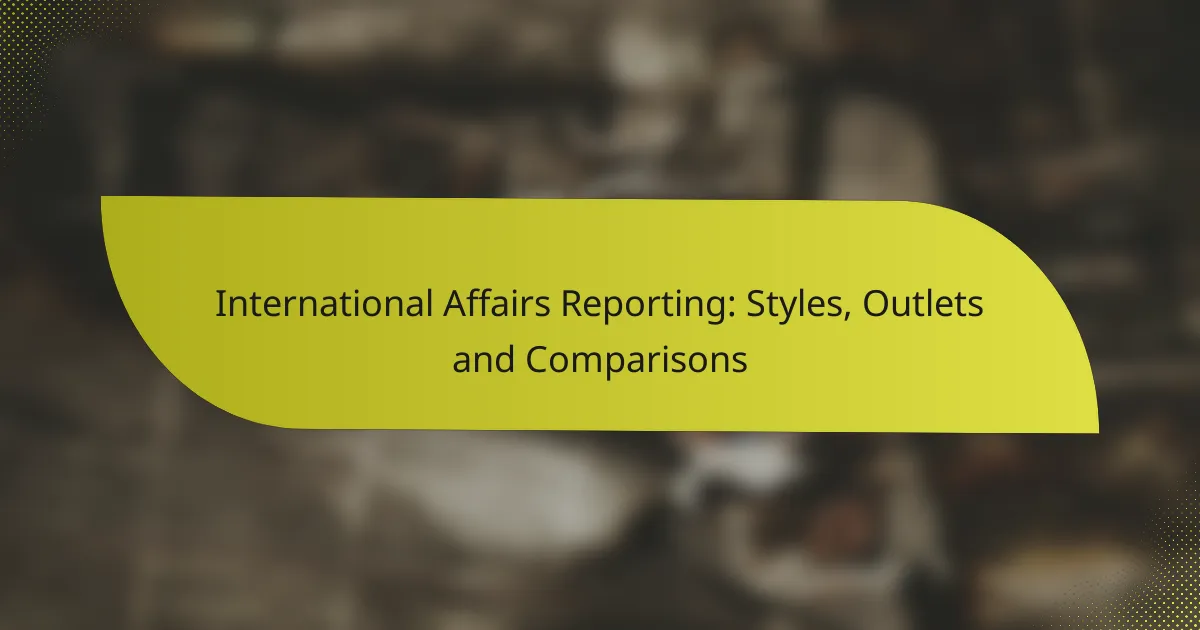International affairs reporting plays a crucial role in shaping public understanding of global issues, utilizing various styles tailored to specific audiences. Major outlets like The New York Times, BBC News, and Al Jazeera each adopt unique editorial approaches, reflecting diverse perspectives and cultural contexts. By examining these differences, readers can better appreciate the complexities of international news coverage.
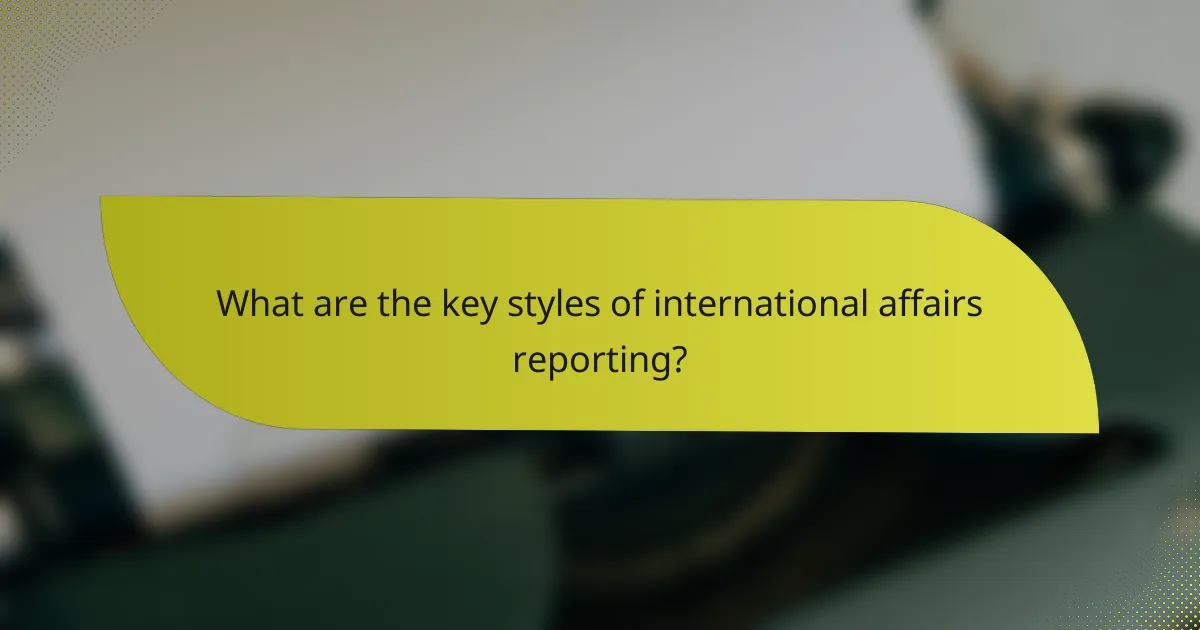
What are the key styles of international affairs reporting?
International affairs reporting encompasses various styles, each serving distinct purposes and audiences. Understanding these styles helps readers navigate the complexities of global issues effectively.
Investigative journalism
Investigative journalism focuses on uncovering hidden truths, often involving in-depth research and analysis. This style aims to expose corruption, human rights violations, or other significant issues that may not be readily visible to the public.
Reporters in this field typically rely on confidential sources, documents, and data analysis. For example, a journalist might investigate a government’s misuse of funds, requiring extensive interviews and fact-checking to ensure accuracy and credibility.
Analytical reporting
Analytical reporting provides context and interpretation of international events, helping readers understand their implications. This style often combines data, expert opinions, and historical context to present a comprehensive view of a situation.
For instance, an analytical piece might explore the effects of a trade agreement on global markets, breaking down economic indicators and expert forecasts to illustrate potential outcomes. This approach helps readers grasp the broader significance of news events.
Opinion pieces
Opinion pieces express the writer’s viewpoint on international affairs, often advocating for specific actions or policies. These articles can influence public opinion and spark debate on critical issues.
Writers typically use persuasive language and personal anecdotes to support their arguments. For example, an opinion article might argue for stronger climate policies, drawing on recent scientific findings and personal experiences to bolster the case.
Breaking news coverage
Breaking news coverage delivers timely updates on urgent international events as they unfold. This style prioritizes speed and accuracy, often providing essential facts and immediate reactions from key stakeholders.
For example, during a sudden political crisis, reporters may quickly relay information about government responses and public reactions, ensuring that audiences are informed in real-time. Clarity and brevity are crucial in this fast-paced reporting style.
Feature stories
Feature stories delve deeper into specific aspects of international affairs, often highlighting human interest elements or unique perspectives. This style allows for storytelling that engages the reader while providing valuable insights.
For instance, a feature might profile a humanitarian worker in a conflict zone, exploring their experiences and challenges. Such narratives can humanize complex issues, making them more relatable and compelling to the audience.
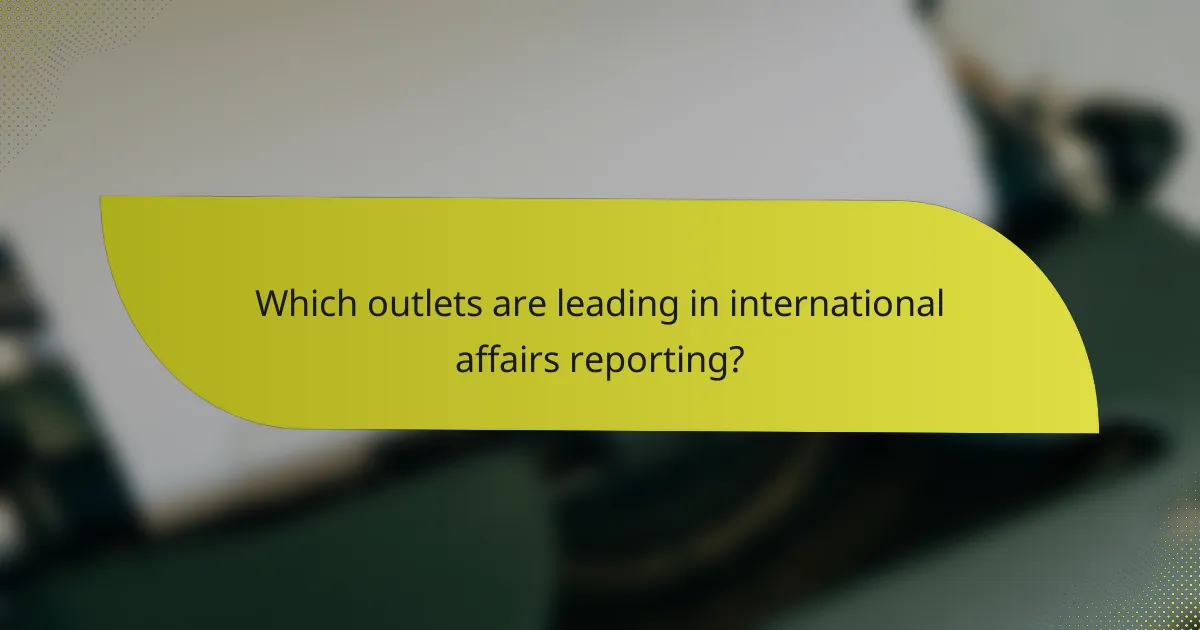
Which outlets are leading in international affairs reporting?
Several prominent outlets are recognized for their comprehensive coverage of international affairs, including The New York Times, The Guardian, BBC News, Al Jazeera, and Reuters. Each of these organizations employs distinct reporting styles and editorial focuses, catering to diverse audiences and perspectives.
The New York Times
The New York Times is known for its in-depth analysis and investigative journalism in international affairs. It often features long-form articles that explore the complexities of global issues, providing context and background that help readers understand the implications of current events.
Readers can expect a mix of breaking news, opinion pieces, and feature stories that delve into international relations, economics, and cultural exchanges. The Times also emphasizes the importance of sourcing and fact-checking, which enhances its credibility.
The Guardian
The Guardian offers a progressive perspective on international affairs, often highlighting social justice issues and human rights. Its reporting is characterized by a commitment to transparency and accountability, frequently covering stories that may be overlooked by other outlets.
In addition to traditional news articles, The Guardian provides analysis and commentary, allowing readers to engage with various viewpoints on global events. Its digital platform is particularly strong, making it accessible to a worldwide audience.
BBC News
BBC News is a leading source for international reporting, known for its impartiality and extensive global network of correspondents. It provides timely updates on breaking news and offers a range of multimedia content, including videos and podcasts that enhance storytelling.
The BBC emphasizes balanced reporting, often presenting multiple sides of an issue. Its international coverage is comprehensive, addressing political, economic, and cultural dimensions of global events, making it a trusted source for many viewers.
Al Jazeera
Al Jazeera is recognized for its unique perspective on international affairs, particularly in the Middle East. It provides in-depth coverage of regional conflicts, politics, and social issues, often featuring voices and stories from local communities that are underrepresented in mainstream media.
The outlet’s commitment to investigative journalism and documentary-style reporting sets it apart. Al Jazeera’s content is available in multiple languages, broadening its reach and impact on global audiences.
Reuters
Reuters is a major player in international news reporting, known for its speed and accuracy. It provides real-time updates and breaking news across various sectors, including politics, finance, and technology, making it a go-to source for professionals and decision-makers.
The outlet’s focus on factual reporting and data-driven journalism helps ensure that its coverage remains reliable. Reuters also offers in-depth analyses and market insights, catering to a diverse audience that includes businesses and policymakers.
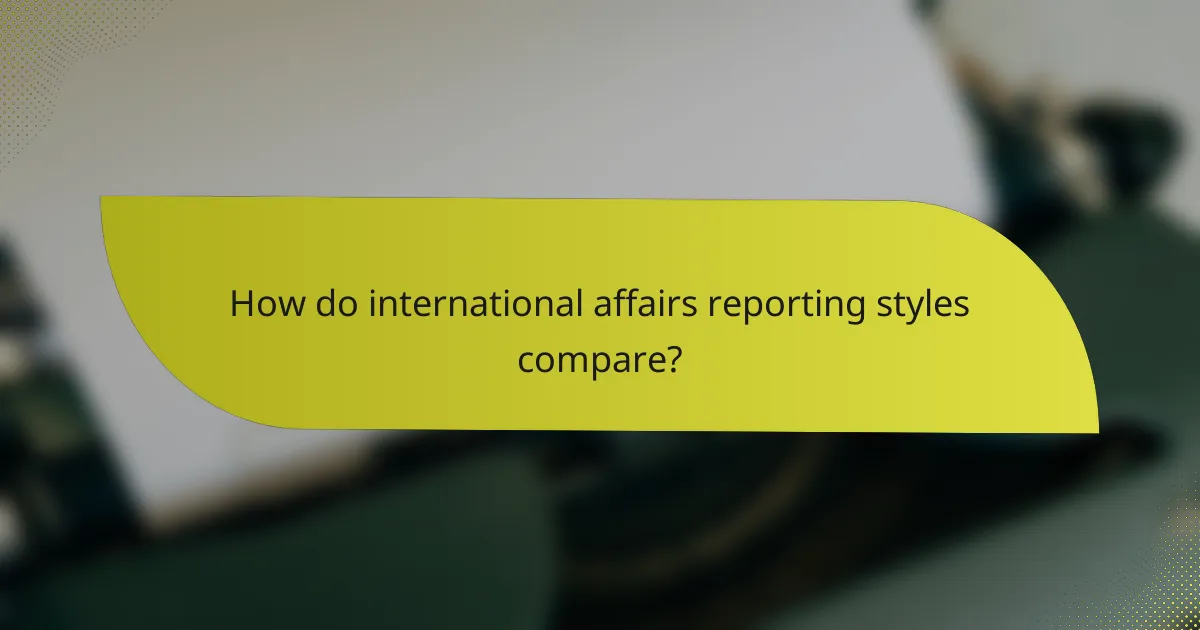
How do international affairs reporting styles compare?
International affairs reporting styles vary significantly across different outlets and regions, impacting how news is presented and perceived. Key differences include editorial focus, audience engagement strategies, and the influence of cultural context.
Differences in editorial focus
Editorial focus in international affairs reporting can differ based on the outlet’s mission and target audience. For example, some media may prioritize in-depth analysis and investigative reporting, while others may focus on breaking news and quick updates. Outlets like The Economist often provide comprehensive analyses, whereas CNN might emphasize immediate coverage of unfolding events.
Additionally, regional outlets may concentrate on local implications of global events, tailoring their content to resonate with national interests. This can lead to varying interpretations of the same event, depending on the outlet’s editorial stance.
Variations in audience engagement
Audience engagement strategies in international affairs reporting can range from interactive content to traditional articles. Some platforms, like Al Jazeera, utilize social media to foster discussions and gather audience opinions, while others may rely on standard reporting formats. Engaging audiences through polls, comments, and live discussions can enhance the connection between the news and its consumers.
Moreover, different demographics may prefer varied engagement methods. Younger audiences might favor multimedia content, such as videos and podcasts, while older readers may prefer detailed articles and reports. Understanding these preferences is crucial for effective communication.
Impact of cultural context
Cultural context plays a vital role in shaping international affairs reporting. Media outlets often reflect the values, beliefs, and historical perspectives of their audiences, which can influence how news is framed. For instance, Western media may emphasize democratic values, while outlets in authoritarian regimes might focus on stability and state narratives.
Furthermore, cultural sensitivities can affect language use and the portrayal of events. Reporters must navigate these nuances to avoid misinterpretation and ensure respectful representation of different cultures. This awareness is essential for fostering accurate and responsible journalism in a globalized world.
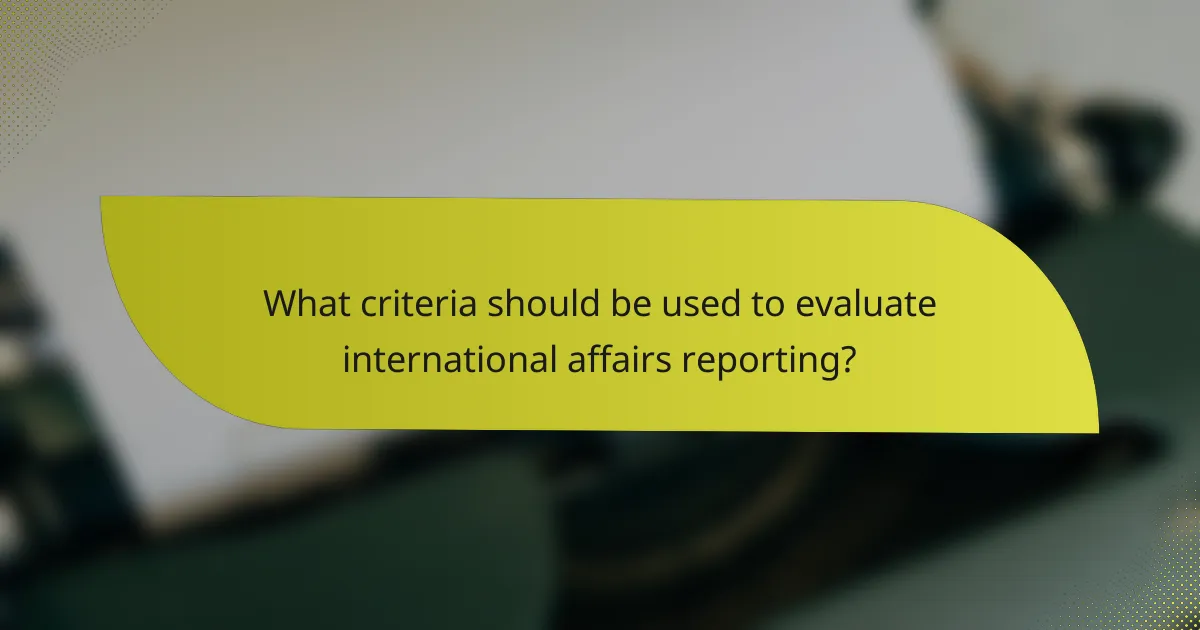
What criteria should be used to evaluate international affairs reporting?
Evaluating international affairs reporting requires a focus on accuracy, depth of analysis, and the ability to provide context. These criteria help ensure that the information presented is reliable, insightful, and relevant to the audience.
Accuracy and fact-checking
Accuracy is paramount in international affairs reporting, as misinformation can lead to misunderstandings and conflict. Reporters should verify facts through multiple reputable sources, including government documents, expert interviews, and established news outlets.
Fact-checking should be a continuous process throughout the reporting cycle. Journalists can employ tools and resources such as fact-checking websites and databases to confirm the validity of claims made in their articles. Ensuring accuracy not only builds trust with the audience but also enhances the credibility of the publication.
Depth of analysis
Depth of analysis involves providing comprehensive insights into the complexities of international issues. Reporters should go beyond surface-level reporting by exploring the historical, political, and social contexts that shape current events.
To achieve depth, journalists can incorporate expert opinions, statistical data, and comparative analyses. For example, discussing the implications of a trade agreement might include exploring economic impacts across different sectors and countries. This thorough approach helps readers understand the broader significance of international affairs.
